Chapter Three - Castilla la Vieja
Castilla la Vieja
YES, I have been in Spain; I can swear most solemnly to that, and I have a number of witnesses to prove it, e.g. the hotel-labels on my suit-case. And yet as far as I am concerned, the land of Spain is shrouded with an impenetrable mystery, for the sound reason that I entered it and left it again at dead of night; it was just as if we had been taken blindfold across the River Acheron or through the Mountains of Dreams.
I tried to distinguish something in the darkness outside; I saw something that looked like a cluster of black patches on the bare hill-sides; perhaps they were rocks or trees, but they might also have been large animals.
The mountains were very severe and strange of aspect; I decided that I could get up early to have a look at them at daybreak. I did get up early; according to the map and time-table we ought to have been somewhere in the mountains, but all I saw below the red streak of daybreak was a brown, bare and frowning expanse; it looked like the sea or a mirage.
I though I must be feverish, for I had never seen a plain like that before; so I went to sleep again, and when I woke up once more and looked out of the window, I discovered that I was not feverish, but I was in a different land, and that land was Africa.
I don’t know how to put it; there is a green tint here, but it is different from ours; it is dim and drab. There is a brown tint, but it is different from ours; it is not the brown tint of ploughed earth, but the brown tint of stony land and powdered lignite.

There are red rocks here, but there is something stagy about their redness. There are mountains too, which are fashioned not of rock, but of deep clay and boulders. These boulders do not sprout out of the soil; they look as they had been showered down on to it.
The mountains are called Sierra de Guadarrama; God, who created them, must be very mighty, or how else could He have made so many stones? Among the boulders grow dark oaks and beside them hardly anything but wild thyme and thorns.
It is bare and large, as parched as a desert, as mysterious as Sinai; I do not quite know how to express my meaning, but it is another continent, it is not Europe. It is sterner and fiercer than Europe; it is older than Europe. It is not a mournful wilderness; it is solemn and strange, rough and majestic.
People dressed in black, black goats, black pigs against a background of torrid russet. A harsh existence, scorched to blackness, among the heated stones

Here and there the bare boulders are streams, the bare stones from a plain and the bare stone walls a Castillian pueblo. An angular tower with a wall around; it is more of a stronghold than a village. It is welded together with the rock on which they stand. The huts are huddled together one against the other, as if they were awaiting an attack. This then is a Spanish village. The human dwellings blend with the stony earth.
And in the brown, stony slope there is a miraculous sight: dark green gardens, avenues of dark cypresses, a dense and gloomy park; a huge, stark and lordly cube with four bristling turrets.

A monumental solitude, a hermitage with a thousand haughty windows: El Escorial. The cloister of the Spanish kings. A castle of sorrow and pride above the parched country-side, where meek asses graze.
